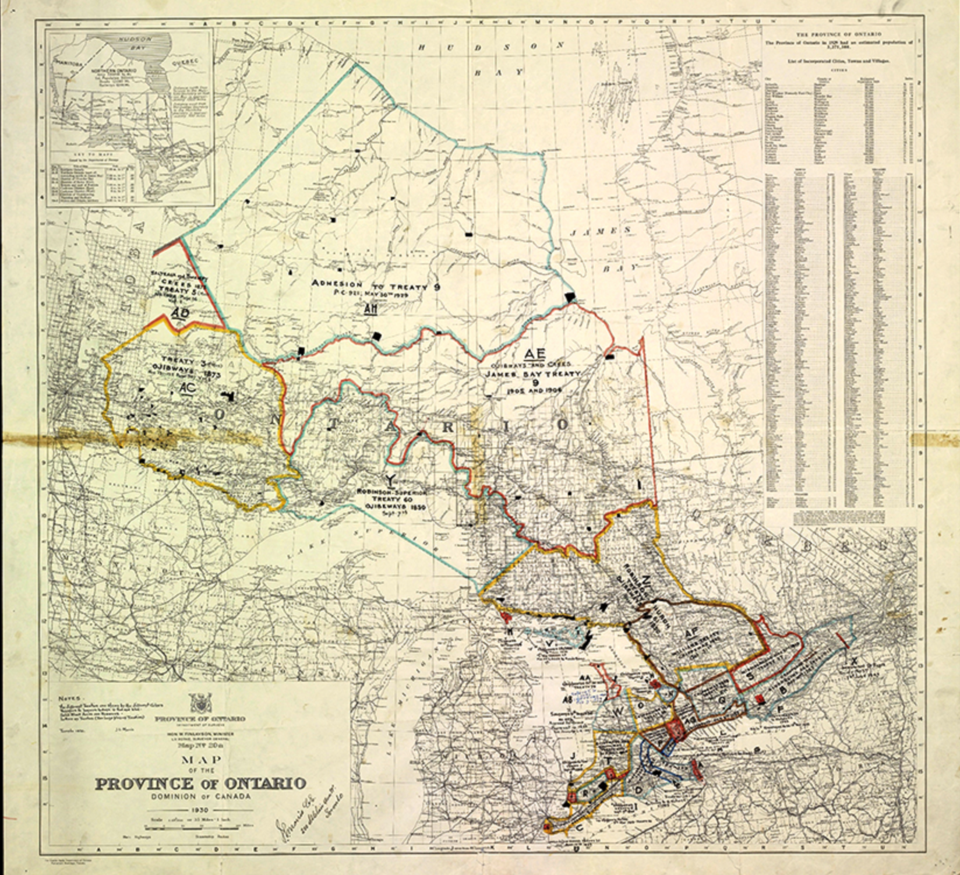EDITOR’S NOTE: This article originally appeared on The Trillium, a new Village Media website devoted to covering provincial politics at Queen’s Park.
Several First Nations launched a lawsuit against the federal and provincial governments that could have massive implications for the future of resource extraction and Crown-Indigenous relations in Ontario and Canada.
The 10 First Nations are all from Treaty 9 territory, also known as the James Bay territory, which covers a huge swath of Ontario from Timmins north to Hudson's Bay and west to northern parts of the Manitoba border. They're looking to end the government's "unilateral jurisdiction and decision-making control" throughout the region, according to a statement by the law firm Woodward and Company.
When the treaty was signed in the early 1900s, the agreement was that "First Nations would retain their decision-making governance over the lands and resources, and that the Crown governments would have some governance rights but not the right to take over," the release said. In the time since, the suit alleges, the Crown hasn't held up its end of the deal.
"Back when Treaty 9 was signed, Canada and Ontario made a written text of Treaty 9 on their own, in their headquarters, before ever talking to us First Nations. They then came to talk to us and made promises and commitments to us orally that we agreed to. This oral agreement is not the written text," said Attawapiskat First Nation Chief Sylvia Koostachin Metatawabin.

“The treaty we entered was to share mutual benefits with the settlers, agreeing to share the land and resources. We did not agree to, nor did we have a frame of reference to understand, the Crown’s colonial, racist and oppressive intentions tied to the treaty,” said Neskantaga First Nation Chief Chris Moonias.
The Ring of Fire, a mineral-rich deposit central to the province's critical minerals ambitions, sits in Treaty 9 territory.
"This is a warning to all those mining development companies: go back and you tell (Premier Doug) Ford and (Indigenous Affairs and North Development Minister Greg) Rickford and other ministers, you tell (Prime Minister Justin) Trudeau and other ministers with the federal government, they need them to sit down and work this out in an equal co-jurisdiction," said Kate Kempton, the Woodward and Company lawyer taking the lead on the case.
Several leaders from the First Nations came to Queen's Park Wednesday to announce the suit, along with Kempton. Kempton filed official notice of the statement of claim to the Crown, which starts a 60-day period before the actual statement of claim is filed.
"Canada is a colonialist country. Colonialism is a crime. This case is to end crime," Kempton said at the press conference.
The claim is asking the courts to nullify permits, approvals or authorizations granted by Ontario and Canada after the claim is officially filed under 12 laws related to mining, fishery, forestry, planning, water management, and environmental oversight within the treaty territory. Seven are Ontario-specific laws, including the Mining Act, Planning Act, Environmental Assessment Act, and more.
"The acts listed ... are unconstitutional or inapplicable and of no force and effect in respect of Treaty 9 territory," the claim said.
The Nations want to set up a co-jurisdictional arrangement where First Nations and the Crown would have formal mechanisms to figure out who consents to what and where, as well as a formal dispute resolution mechanism "similar to other situations governed by bilateral or multilateral treaties with multiple governments or decision-makers," according to the claim.
There's a recent "case in Ecuador that found that Indigenous peoples there have the right to consent or withhold consent to developments in their territory," Kempton said.
"Outside of that there are tons of bilateral treaties, where both state governments ... have to do something and if they don't, if there's an impasse, then there's an independent third-party decision-maker," she said. "Exactly what this would look like has to be negotiated. There has to be oversight of the results by independent (United Nations) type authorities to make sure that one isn't riding roughshod over the others."
On top of setting up a new Crown-Indigenous relations regime, the Nations are also seeking a $95-billion compensation package to be paid by the federal and provincial governments.
"The damages portion is for the last 120 years," Kempton said.
"The Crown governments have been unilaterally making decisions, imposing their will and their ways, unilaterally extracting resources from the land ... and so we did some math and said basically you owe about $100 billion for all the harm that you've done illegally."
The money, however, isn't the main issue, she added.
"The unfortunate thing about Canadian law is it converts harm into money," she said.
"The first things we're seeking are orders and directions from the court to the Crown governments to respect and uphold the First Nations' jurisdiction to interpret the treaty the way that it was always understood, and not the fraudulent treaty that Canada and Ontario took out of their back pocket and has been showing to the public ever since."
Once the 60-day notice period is up and the claim is officially filed, the Nations may seek to file injunctions, Kempton said.
The claim "will enable us to bring motions to seek injunctions ... to stop unilateral decision-making, especially where those decisions threaten the way of life of the First Nations whose lands and whose governments those lands are under," she said.
"I don't know when we'll do that. That's the instruction of the clients," she added.
Launching the suit is the first step in what's expected to be a long process, she said.
"If this goes all the way to trial, we're looking at at least over 10 years away."
Rickford was asked about the case in question period, but declined to comment on it specifically, saying, "I won't talk to matters that are before the courts."
This article originally appeared on The Trillium, a new Village Media website devoted to covering provincial politics at Queen’s Park.




